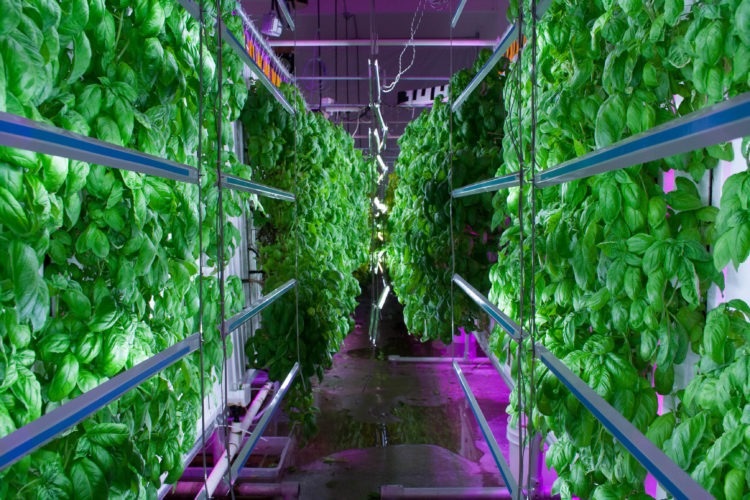Due to increasing population and the speedy development in Africa. The demand for food security keeps increasing but it seems African Agric entrepreneurs are not leveraging technological innovations to meet up with all these challenges.
We have seen many African techpreneurs tapping into different sectors in agritech, however, the peak of technology farming is yet to get the necessary attention it deserves.
To make use of the most promising innovations, technologies like vertical farming, indoor greenhouses, and controlled environment farming need to be launched in African to help meet and overcome our current challenge in food security.
Vertical farms use high tech lighting and climate-controlled buildings to grow crops indoors while using less water and soil. The modern ideas of vertical farming use indoor techniques and controlled-environment agriculture (CEA) technology, where all environmental factors can be controlled.
CEA is a technology-based approach toward food production and it is to provide protection and maintain optimal growing conditions throughout the development of the crop. Production takes place within an enclosed growing structure such as a greenhouse or building.
Since it’s a closed growing system with controlled evaporation from plants, these farms use 95% less water than traditional farms.
Over time, there has been an increase in the number of vertical farming enterprises in the world, especially in North America and Asia. In the US, Chicago is home to several vertical farms, while New Jersey is home to AeroFarms which is also the world’s largest vertical farm. Other countries such as Japan, Singapore, Italy and Brazil have also witnessed a rise in their vertical farms.
In fact, Netherlands is on the verge of completing its first large-scale commercial vertical indoor farm which is expected to serve Europe’s largest supermarket chains with high quality, pesticide-free fresh-cut lettuce. As the trend continues, vertical farming is expected to be valued at US$5.80 billion by the year 2022.
With the precedent that has been set, it is quite obvious that Africa has unique opportunities for vertical farms and Controlled Environment Agriculture.
The beautiful part of it is that most vertical farms do not need soil because they use aeroponics or hydroponic systems which dispenses nutrients needed for plants to grow via mist or water. This technique is ideal for meeting the challenges of urbanisation and the rising demand by consumers for high-quality, pesticide-free food in Africa.
South Africa has taken various initiatives to spur innovation in its agriculture sector. Also, other Sub-Saharan African cities in Nigeria and Kenya, South African metropolises are joining the footsteps of many global cities to introduce sustainable urban indoor farming. But much more needs to be done.
Although, we can’t turn away our eyes from the effort that has been made to launch Vertical Farming, and CEA across Africa, so much more needs to be done.
With the population expected to rise in most African cities, this is the right time to start investing in innovative urban agriculture practices.
Why Vertical Farming Need to be Adopted in Africa
1. Land can be conserved
The great thing about vertical farming is that it takes up less space. In fact, these farms are currently being run inside buildings in cities. With irrigable land fast running out in some major cities across as urbanisation speeds up, being able to grow entire crops in an enclosed could help stave off future food shortages.
2. The quantity of Chemical Needed is reduced
Since plants are not subjected to insects and severe weather patterns, crops are less exposed to pesticides, fungicides and insecticides.
3. A stable food source
With the absence of floods, rain and drought in vertical farming, healthy crops are almost guaranteed all year-round, eliminating the possibility of shortages. Season-specific produce such as citrus, berries and avocados can also be grown throughout the year regardless of weather conditions.
4. It’s quick
Aeroponic farming has enabled growers to harvest and propagate tomatoes within 10 days. Normal farming methods would take between 6 to 8 weeks to produce a full-grown plant.
5. We can use it in space
Since the plants don’t require any sunlight or soil, Agric produce can grow in space. Scientists have already started testing aeroponics on various seeds to determine the best way to grow produce in outer space.
6. It’s cost-effective
Although to purchase a sizeable building to farm in, the overall infrastructure and equipment needed is quite expensive, however, in the long-run, vertical farms cost far less to maintain than full-fledged conventional set-ups.
7. The products are more nutritious
In some cases, vertical farmers add more nutrients to the water or mist being sprayed on the plants. The plants absorb these nutrients, making them richer in vitamins and minerals than many mass-produced crops.
8. The great avenue to create more jobs
Since these plants need to be maintained by many hands, more workers may be needed.
Having highlighted why vertical farming should be focused on in Africa, techpreneurs, innovators and entrepreneurs should start thinking of how to specialise in growing Agric produce vertically to meet the rising demand for food in Africa.
If vertical farming can be adopted fully in Africa, the pressure that a growing population brings will be relieved.














